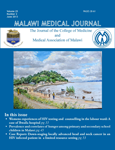
|
Malawi Medical Journal
College of Medicine, University of Malawi and Medical Association of Malawi
ISSN: 1995-7262
Vol. 25, No. 2, 2013, pp. 50-52
|
 Bioline Code: mm13013
Bioline Code: mm13013
Full paper language: English
Document type: Research Article
Document available free of charge
|
|
|
Malawi Medical Journal, Vol. 25, No. 2, 2013, pp. 50-52
| en |
Adherence to hand hygiene protocol by clinicians and medical students at Queen Elizabeth Central Hospital, Blantyre-Malawi
Kalata, N.L.; Kamange, L. & Muula, A.S.
Abstract
Background
While communicable diseases are the leading causes of morbidity and
mortality in Malawi, the contribution of nosocomial or hospital-acquired
infections (HAIs) is unknown but could be substantial. The single most
important method of preventing nosocomial infections is hand hygiene.
We report a study which was conducted in 2011 to investigate adherence
to hand hygiene protocols by clinicians and medical students working at
Queen Elizabeth Central Hospital in Blantyre, Malawi.
Methods
There were two parts to the study: a single blinded arm in which participants
were observed without their knowledge by trained nurses; and a second
arm which included self-completion of questionnaire after participant
consent was obtained. The 2009 World Health Organization hand hygiene
technique and recommendations which were adopted by Queen Elizabeth
Central Hospital were used to define an opportunity for hand washing and
effectiveness of hand washing. Hand hygiene effectiveness was defined as
adherence to at least 6 out of 7 steps (80%) of the hand hygiene technique
when using alcohol-based formulation or at least 8 out of 10 steps (80%)
of the hand hygiene technique when using water and soap formulation
before and after having direct contact with patients or their immediate
surroundings.
Results
Clinicians were found to have disinfected their hands more than medical
students (p<0.05) but effectiveness was similar and very low between the
two groups (p=0.2). No association was also found between having a
personal hand sanitizer and hand hygiene practice (p=0.3). Adherence to
hand hygiene was found to be 23%. Most of the participants mentioned
infection transmission prevention as a reason for disinfecting their hands.
Other reasons mentioned included: a routine personal hand hygiene
behaviour and discomfort if not washing hands. The top three reasons
why they did not disinfect hands were forgetfulness, unavailability of
sanitizers and negligence.
Conclusion
Adherence to hand hygiene practice was found to be low, with
forgetfulness and negligence being the major contributing factors. A
hospital-wide multifaceted program aiming at clinicians and students
education, adoption of alcohol based hand rubs as a primary formulation,
production of colored poster reminders and encouraging role modeling of
junior practitioners by senior practitioners can help improve compliance
to hand hygiene.
|
| |
© Copyright 2013 - Malawi Medical Journal
Alternative site location: http://revista.uft.edu.br/index.php/jbb/index
|
|
